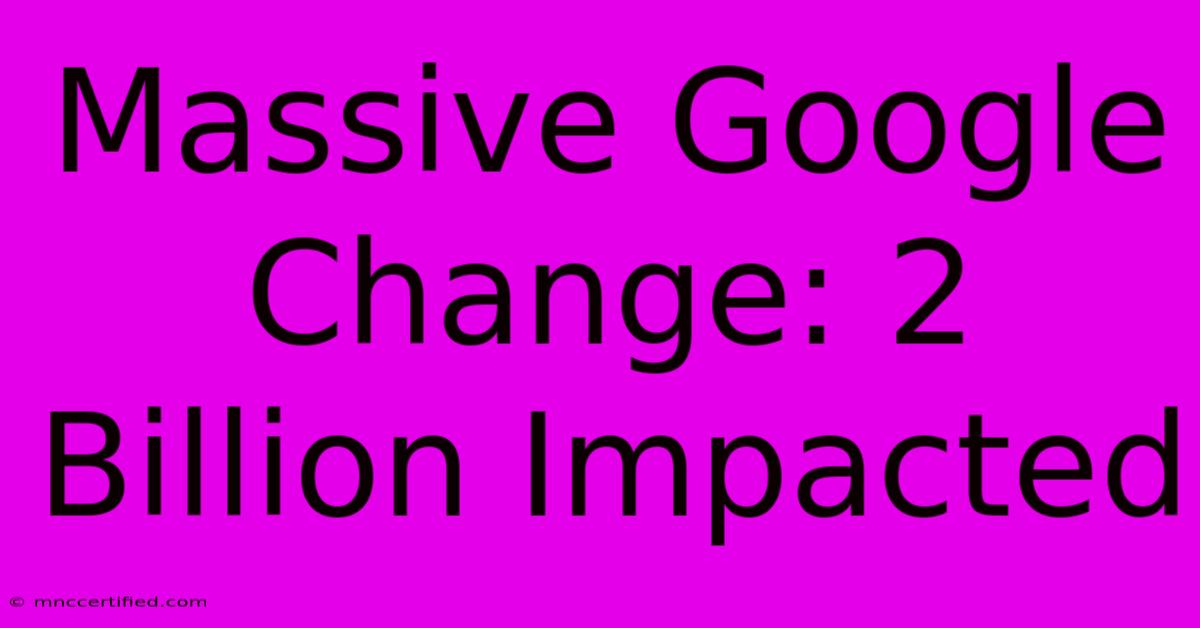Massive Google Change: 2 Billion Impacted

Table of Contents
Massive Google Change: 2 Billion Users Impacted
The internet giant, Google, recently implemented a significant change affecting an estimated two billion users globally. This update, while not explicitly detailed in a single press release, manifests across various Google services and has sparked considerable discussion among users and industry experts alike. This article delves into the potential implications of this widespread alteration, examining its impact on user experience, privacy concerns, and the future of Google's services.
What Changed? Deciphering the "Massive" Update
Unfortunately, pinpointing the exact nature of this change proves difficult due to Google's decentralized approach to updates. Instead of one singular announcement, alterations are rolled out across different platforms, impacting various services. This includes, but is not limited to:
- Google Search: Some users report changes in algorithm behavior, including altered search results rankings, a modified snippet display, and a shift in the prominence of certain websites. While Google regularly updates its algorithm, the scale of this perceived change suggests something more substantial.
- Google Ads: Advertisers have noted potential fluctuations in campaign performance, indicating adjustments to ad targeting, bidding strategies, or quality score calculations. This could impact ad visibility and return on investment for businesses relying on Google Ads.
- Google Maps: Modifications to location data processing, improved routing algorithms, or alterations to the user interface may be part of this broader update. These subtle changes could significantly affect user experience and navigation.
- Google Chrome: Potential adjustments to browser privacy settings, extensions compatibility, or performance enhancements could also contribute to this perceived "massive" change.
The lack of a centralized announcement makes it challenging to definitively outline all aspects of the update. The sheer number of users impacted underscores the scale and complexity of the changes.
The Impact: User Experience and Privacy Concerns
The significant user impact raises several key concerns:
- User Experience: Changes in search results, ad display, or map functionality can directly affect how users interact with Google's services. A less intuitive user experience can lead to frustration and reduced engagement.
- Privacy Implications: While Google maintains a commitment to user privacy, any large-scale update naturally raises concerns regarding data handling and user tracking. Users should remain vigilant about their privacy settings and be aware of potential changes to data collection practices. Understanding your privacy settings and Google's privacy policy is crucial.
- Business Implications: For businesses relying on Google services for advertising, marketing, or other operational aspects, the changes can impact revenue streams and overall efficiency. Adapting to these changes and staying informed is vital for maintaining a competitive edge.
SEO Implications: Adapting to the New Landscape
The update has significant implications for Search Engine Optimization (SEO). Websites relying on previous algorithm behaviors might experience a drop in rankings. Adapting to this new environment demands a reassessment of existing SEO strategies:
- Content Quality: High-quality, original content that offers value to the user remains crucial.
- Technical SEO: Ensure your website is technically sound, with fast loading speeds and mobile-friendliness.
- Keyword Research: Stay updated with keyword trends and adapt your content strategy accordingly.
- Backlinks: Continue to focus on acquiring high-quality backlinks from reputable sources.
Looking Ahead: Navigating the Shifting Sands of Google
This "massive" Google change underscores the dynamic nature of the online landscape. Staying informed, adapting strategies, and prioritizing user experience are paramount for both individual users and businesses alike. Regularly monitoring Google's official announcements (though fragmented), industry news, and user feedback is vital for navigating these continuous changes. The future of Google's services will undoubtedly depend on its ability to balance innovation with user needs and privacy concerns. The lack of transparency around this specific update highlights the need for greater communication from Google regarding significant changes impacting billions of users worldwide.

Thank you for visiting our website wich cover about Massive Google Change: 2 Billion Impacted. We hope the information provided has been useful to you. Feel free to contact us if you have any questions or need further assistance. See you next time and dont miss to bookmark.
Featured Posts
-
Browards Spirit Bankruptcy Fallout
Nov 19, 2024
-
Storm Shadow Missiles Uk Aid To Ukraine
Nov 19, 2024
-
Star And Shield Insurance Florida
Nov 19, 2024
-
Trailer Rental Business Insurance
Nov 19, 2024
-
Wisdom Tooth Extraction Insurance
Nov 19, 2024